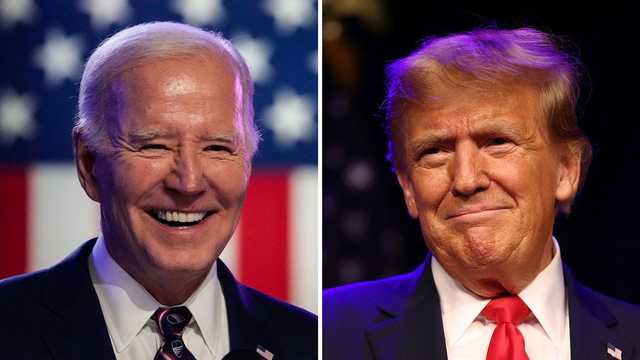The Biden-Trump rematch comes into view with dueling visits to Georgia

ATLANTA - The 2024 presidential election campaign will pick up Saturday where the 2020 contest left off. Or, more precisely, in a place where it never actually ended.
Georgia was so close four years ago that Republican Donald Trump finds himself indicted here for his push to "find 11,780 votes" and overturn Democrat Joe Biden's victory.
Now, fresh off their Super Tuesday domination to set up a near-certain rematch, the two rivals will hold dueling events in a state that both parties see as pivotal to winning in November.
"Elections are hard. We're a true battleground state now," said U.S. Rep. Nikema Williams, an Atlanta Democrat who doubles as state party chairwoman.
Once a Republican stronghold, Georgia is now so competitive that neither party can agree on how to describe today's divide. A "52-48 state," said Republican Gov. Brian Kemp, whose party controls state government.
"We're not blue, we're not red,"
Williams countered, but "periwinkle," a claim she supports with Biden's 2020 win and the two Democratic senators, Raphael Warnock and Jon Ossoff, Georgia sent to Washington.
There is agreement, at least, that Biden and Trump each have a path to victory - and plenty of obstacles along the way.
"Biden's numbers are in the tank for a lot of good reasons, and we can certainly talk about that.
And so, it makes it where Trump absolutely can win the race," Kemp said at a recent forum sponsored by Punchbowl News.
"I also think he could lose the race. I think it's going to be a lot tougher than people realize."
A perilous balance for both parties
Biden's margin was about a quarter of a percentage point in 2020. Warnock won his 2022 Senate runoff by 3 points.
Kemp was elected in 2018 by 1.5 percentage points but expanded his 2022 reelection margin to 7.5 points, a blowout in a battleground state.
In each of those elections, Democrats held wide advantages in the core of metro Atlanta, where Biden will be Saturday.
They also performed well in Columbus and Savannah and a handful of rural, majority-Black counties.
But Republicans dominated in other rural areas, small towns and the smallest cities - like Rome, where the former president will appear Saturday in the congressional district represented by archconservative firebrand Marjorie Taylor Greene.
The fast-growing, diversifying suburbs and exurbs of metro Atlanta, meanwhile, offer the most opportunity for swings, especially from GOP-leaning moderates disenchanted with Trump.
"This will be won or lost on the margins," said Eric Tanenblatt, an Atlanta leader and longtime Republican fundraising bundler who backed Nikki Haley's GOP bid against Trump.
Democrats have a head start in building their campaign organization and promise sustained, direct outreach to millions of Georgians - different from the pandemic-limited 2020 campaign and more like Warnock's reelection bid.
"We're not taking anything for granted," Williams said.
"We're going to continue to talk to voters about the issues that matter to them."
But Republicans are confident they can rebound from their recent losses by energizing their base and winning back some of the suburban voters who defected to Biden.
"We have to do a better job of communicating our message and our vision," said Georgia Republican Chairman Josh McKoon, who downplayed any talk of splintering within the party.
"We have a lot of enthusiasm and excitement for 2024."
A clash of styles and substance
Biden and Trump offer a stark contrast in both style and substance, as their dueling visits to Georgia will show.
Biden will visit the Centers for Disease Control and Prevention in Atlanta, where he will receive a briefing on the latest developments in the fight against the coronavirus pandemic.
He will also tour a vaccination site at Morehouse School of Medicine, a historically Black institution that has been at the forefront of addressing health disparities in the state.
The president will then deliver remarks at a rally in downtown Atlanta, where he will tout his administration's achievements in combating the virus, passing the $1.9 trillion American Rescue Plan, and advancing his agenda on infrastructure, climate change, voting rights, and immigration.
Donald Trump, meanwhile, will hold a massive rally at the Rome airport, where he will reprise his grievances over the 2020 election, attack Biden's policies, and endorse his allies for various offices.
He will also take aim at Kemp, whom he blames for not overturning the election results in Georgia, and whom he has vowed to defeat in the Republican primary.
The former president will also likely tease his own plans for 2024, as he has done in previous rallies and interviews. He has not officially announced his candidacy, but he has made clear that he intends to run again and that he expects to face Biden in a rematch.
"I think it's going to be a very interesting election," Trump said in a recent interview with Fox News.
"I think people are going to be very surprised by what I do."
Biden, for his part, has also indicated that he plans to seek a second term, despite his advanced age and the challenges of governing in a polarized environment.
"I have every intention of running," Biden said in a recent interview with ABC News. "I don't have any plans to not run.
"The two men have a long and bitter history, dating back to the 2016 campaign, when Trump mocked Biden as "Sleepy Joe" and Biden called Trump a "clown" and a "liar."
They clashed repeatedly during the 2020 race, culminating in two chaotic and contentious debates that showcased their vastly different visions for the country.
Their rivalry has only intensified since the election, as Trump refused to concede and launched baseless allegations of fraud, while Biden sought to unify the nation and move forward with his agenda.
Now, as they prepare to face each other again in Georgia, and possibly in 2024, they will have to contend with the changing dynamics of a state that has emerged as a key battleground for the future of American politics.



